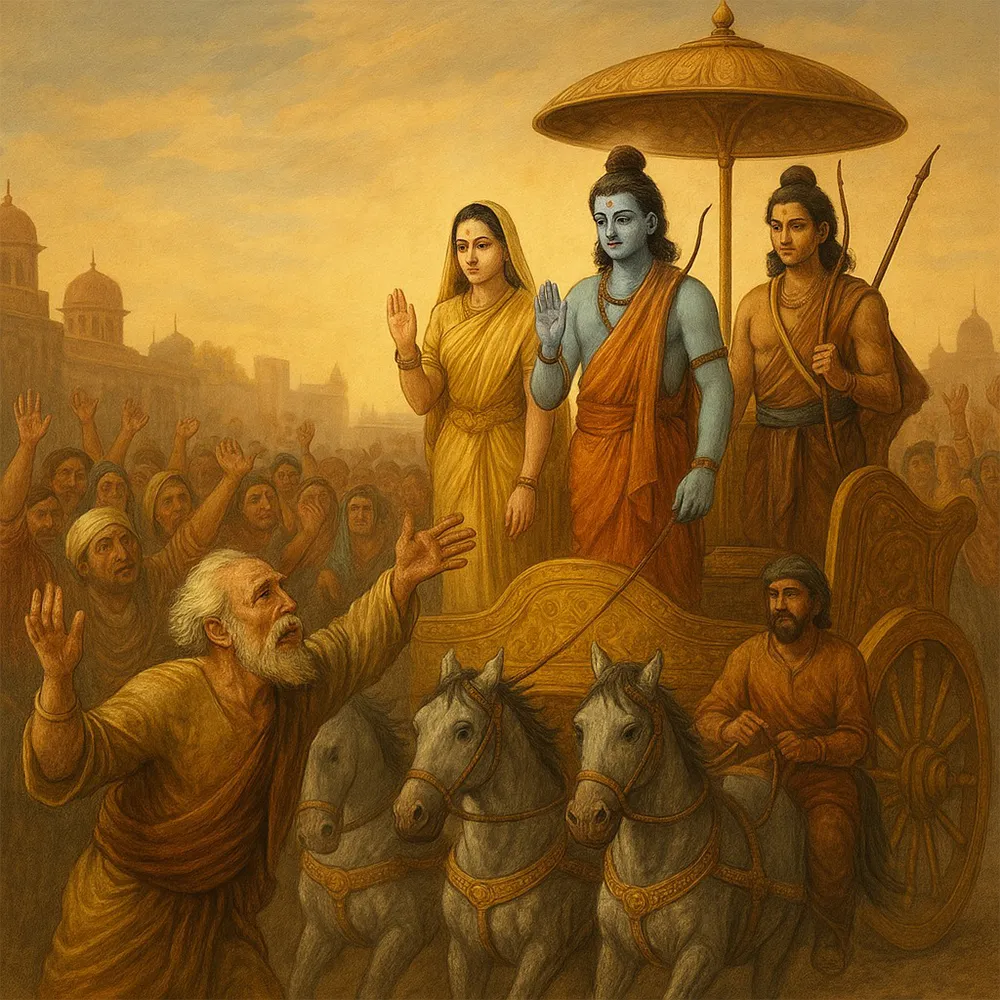The sun dimmed over Ayodhya, as if the skies themselves mourned the sorrow unfolding below. The royal chariot stood waiting, its golden wheels silent, its horses restless. All of Ayodhya gathered — men, women, and children — their eyes wet, their hearts heavy, for today their beloved Rama was leaving.
Rama, clad in simple robes of bark, his hair tied in the way of hermits, stood tall and serene. Beside him, Sita shone like the moon, her face calm yet resolute, while Lakshmana, fierce and loyal, stood ready to follow wherever his brother led.
King Dasharatha, weak and trembling, clung to Rama’s hand. “My son, my life, my Rama — how can I let you go? My eyes cannot bear the sight of you dressed as a hermit. Stay, my child. Let duty wait.”
But Rama, his heart steady as the mountains, bowed low. “Father, your word is my command. Let me uphold your honor, for the world must see that the king of Ayodhya stands by his promises.”
With trembling hands, Dasharatha blessed his son. But Kaikeyi, cold and unyielding, watched from afar, her heart hardened by pride.
Sumantra, the royal charioteer, was summoned to drive Rama, Sita, and Lakshmana to the forest’s edge. His hands shook as he held the reins, for he had watched Rama grow from a boy into the pride of Ayodhya.
The people cried out, their voices breaking, “O Rama, do not leave us! Without you, our city is but an empty shell. How can Ayodhya live, when its soul walks away?”
Rama turned, his eyes soft, his smile gentle. “O people of Ayodhya, do not grieve. My heart carries your love. Bharata shall rule with wisdom and kindness. Honor him, as you honor me.”
But the people would not listen. “We shall follow you, O Rama! Wherever you go, we go.”
And so, the great chariot rolled forward, leaving the golden gates behind. Yet the people followed — weeping, calling out his name — their footsteps heavy with sorrow.
At last, night fell, and the people, tired and broken, fell asleep by the banks of the river Tamasa. Rama, seeing their pain, made a gentle decision. Before dawn, he asked Sumantra to drive the chariot away, quietly, swiftly — so the people would not wake to more sorrow.
By the time the first light kissed the sky, Rama, Sita, and Lakshmana had crossed the borders of Kosala, leaving behind the city that loved them more than life.
When the people awoke and found Rama gone, their cries echoed through the forests. Slowly, with heavy hearts, they turned back — their eyes fixed on the empty road, their souls carrying the weight of farewell.
Thus began Rama’s exile — not in anger, nor in bitterness — but with the grace of one who walks the path of dharma, leaving behind a kingdom drowned in grief, and a father whose heart was breaking with every breath.

